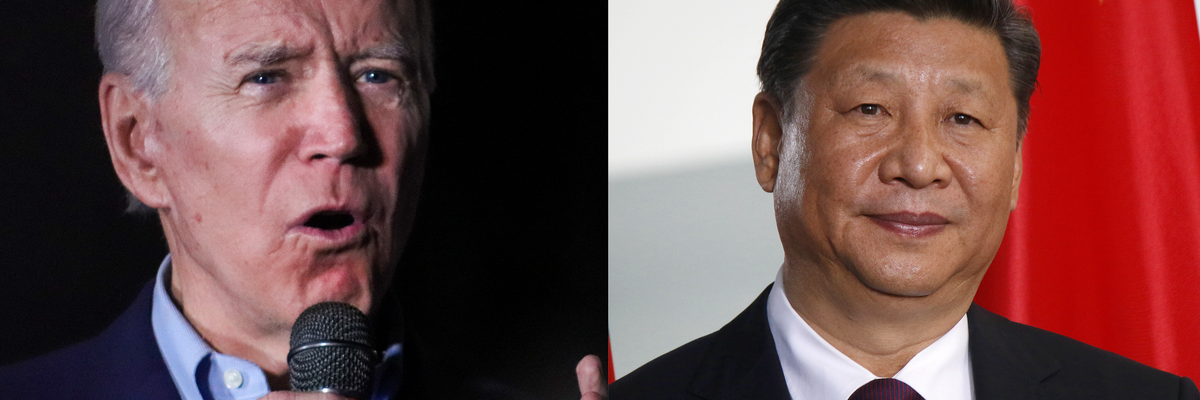Chinese has a good equivalent of the phrase, “the pot calling the kettle black.” It’s “wushibuxiaobaibu,” which (I am told) translates as, “the soldier who retreats 50 steps laughs at the soldier who retreats 100 steps.” In some ways, this is better and more nuanced than our version, because it implies that bits of the pot may indeed be a slightly lighter shade of grey than the kettle — but that this is still an entirely pointless debate.
This phrase perfectly describes the competitive reproaches being hurled by the U.S. and Chinese governments at each other over who is doing more (or rather, less) to combat climate change. Thus President Biden declared at COP26 in Glasgow that:
"I think — presumptuous of me to talk for another leader — but the fact that China is trying to assert, understandably, a new role in the world as a world leader, not showing up? C'mon. The single most important thing that's gotten the attention of the world is climate. … It just is a gigantic issue. They've walked away. How do you do that and claim to be able to have any leadership now? Same with Russia."
Well, yes, it was presumptuous; if only because of course while President Biden did turn up at COP26, thanks to resistance in the U.S. Senate (most notably from members of his own party) he did so empty-handed — and the world noticed. On the critical issue of eliminating the use of coal, China, the biggest global burner of coal, refused to sign a pledge in Glasgow to eliminate it over the next two decades — as did the United States (the third biggest burner of coal).
China can certainly be strongly criticized for powering so much of its stupendous economic growth with coal, to the point where at more than 10.3 billion tons in 2020, its CO2 emissions are by far the largest in the world. This greatly undermines Chinese claims — trumpeted in response to Biden’s scolding — that China leads the world in its response to climate change.
The United States comes second with approximately 5 billion tons of CO2 in 2020. Adjusted for population however, per capita emissions by the United States were 15.2 tons in 2020 — double China’s 7.41. Moreover, relative to per capita income and comparative economic development, China has to date done much better than the United States. It is ahead in developing renewable energy technology, far ahead in the development of electric vehicles, and almost infinitely far ahead in high-speed railways and other public transport. This reflects in part the fact that the leaders of two out of the last four U.S. administrations denied that anthropogenic climate change is even happening and refused to take any new measures whatsoever to limit it. Biden had the grace to apologize for this at Glasgow — and rightly so.
In truth though, no major developed or developing country has much to be proud of in its response to climate change, with the exception of a few small ones like Denmark. Thus Germany, which used to pride itself on its commitment to fighting climate change, allowed itself to be terrified by the Fukushima nuclear accident in Japan (which led to no deaths and no significant leakage of radiation) and by a hysterical, irrational campaign by the German Greens into abolishing its nuclear power plants. The result that German electricity generation remains highly dependent on coal and Germany is missing by a wide margin its commitments under the Paris Agreement. The problem at Fukushima was due to an earthquake and tsunami, and Germany has not suffered an earthquake of tsunami for several million years.
The German, U.S., Australian, and Canadian cases — as those of Brazil and India in the developing world — also demonstrate the folly of claiming that democracy is essential to action against climate change. This line is now being assiduously peddled by a combination of the democratization and anti-Chinese lobbies in the United States and Europe — which are increasingly part of the same nexus. In most cases this argument is also utterly hypocritical, since those making it never showed the slightest interest in the issue of climate change until it provided an opportunity to attack China and preach their ideology.
Any argument that authoritarian rule as such is better for climate change action is equally foolish. The Chinese system may have certain advantages in this regard, but there are also numerous examples of authoritarian and semi-authoritarian states around the world that are performing badly or not at all when it comes to action against climate change.
In the field of foreign and security policy, states rely on and can get away with a great deal of bluff and bluster. Indeed, that beloved Washington term “credibility” is often just another way of saying “successful bluff.”
But this is not true of action against climate change, or the technological and developments on which it depends. As with industrial production in general, you have to make things, and they have to work — and be seen to work. Not just in the long run, but today, no amount of self-praising rhetoric and name-calling will succeed in covering up a failure to take real action. Perhaps when they have both run 200 steps from climate action the American and Chinese administrations will learn to start laughing with each other and not against each other — but I doubt that the rest of the world will be laughing very hard.
















